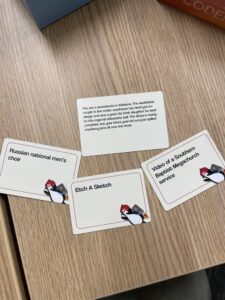Some of the most important mechanics of my group’s game, Filibuster, are situational storytelling and cards that dictate words that must be spoken. As such, the perfect game to explore this is the game, Wing It. Wing it is a physical card game produced by Flying Leap Games. In this game, players are faced with hyper-specific situations like breaking into a mansion just to find it is occupied by your ex, and with this they must weave in words from cards like “12th century catapult” and “38 packets of instant pudding.” These stories are then voted on by a judge where the winner gains a card, or a point.
 Example of the cards: Situation card (top), Word cards (bottom 3)
Example of the cards: Situation card (top), Word cards (bottom 3)
Using the Mechanics-Dynamics-Aesthetics (MDA) framework, Wing It has relatively simple mechanics: object and situational cards, storytelling, point-keeping, and judging. Filibuster also has the card, storytelling, and point-keeping mechanics, however, it differs in that there isn’t judging, rather there is the social deduction aspect that comes from trying to figure out the speaker’s word and the time constraint. These mechanics lead to a wide variety of dynamics amongst players. In Wing It, these can be seen through creative performance, exaggerations, and confidence amongst chaos. In my game, we saw this playout with method acting and getting into character. This often resulted in a better chance at winning the round. In Filibuster, there is often confidence as well in order to convince the audience, however there is also strategy and deep thought required for the listeners. Despite the slightly different mechanics and dynamics, the aesthetic results are generally the same: funny stories, laughing, and chaos. There is a strong sense of fellowship amongst players as they all buy into the silliness required for both games together.
Both games have rounds, however, the outcomes for the round are different. In Wing It, the person who tells the most compelling story for the judge wins the round. Thus, Wing It is zero-sum. For Filibuster, the person speaking simply tries to gain as many points as possible. The end of both games are zero-sum, however, as the player with the most points in each game wins. These different outcomes result in different styles of play and emotions. For Wing It, you will give your all for every round that you play as each round is simply you win, or you don’t. Additionally, there may be more of a sense of accomplishment by having an outright winner for each round. Whereas, for Filibuster, there are more strategies that might come out. For example, even when you are down by a lot of points, you can still come back. I believe that this results in more engagement across players, as you are never out of the game. As such, I think it has a more competitive atmosphere to it.
Ethically, I believe that these games are similar. There must be a conscious effort on the designers of both games to ensure that all words and situations chosen do not discriminate, target, or harm anyone. I think that Wing It has an additional burden when considering the effects of judging on players and the way that it might affect them.



